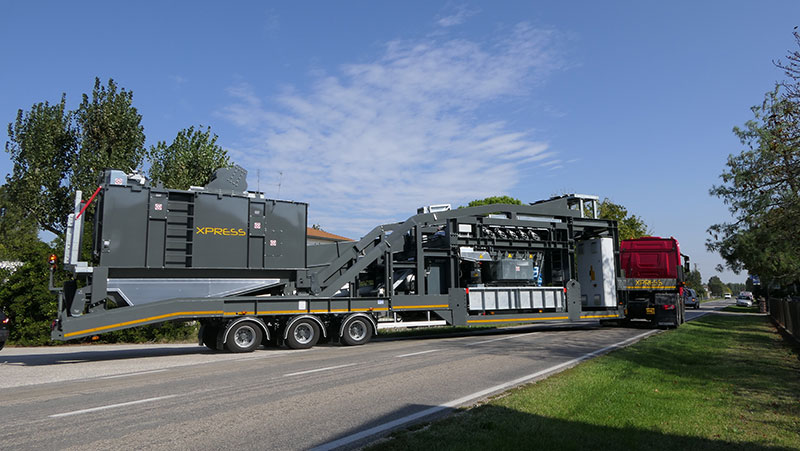The Right Mix
Keywords: Asphalt Plants
Tags: Marini , Asphalt Drum Mixers
As technical knowledge within the road construction industry increases, contractors are looking for cost-efficient asphalt plants that produce high-quality mixes and are easy to transport and erect.

Italian brand Marini, part of Fayat Group, has been active in the MENA region since the 1960s and has a consolidated network of dealers and agents in the Gulf and Mediterranean region, with around 500 asphalt plants installed to date. Its key strengths are its wide product range, the availability of support structures in the market, and dedicated and customised technology and solutions, says Michele Viroli, Marini Sales Director East Europe and Middle East.
“Our product line encompasses the hypermobile solution – Xpress – to the stationary and containerised tower. We have a fully customised solution called Class Towers, up to the Master Tower series, which is our most innovative product with almost full recycling and high energy efficiency.”
One popular product is the BE Tower, a stationary mixing plant with output of 100-240 tonnes hourly production. It has a modular design and containerised components, making it ideal for overseas projects.
Another is the Xpress, a fully mobile plant with hourly production of 120-200 tonnes. “With a compact design, and engineered for immediate erection even without a crane thanks to its hydraulic lifting system, this is the ideal solution for small and medium projects in different locations, which is quite a common situation for customers in Africa,” says Viroli
The main customer segments are contractors producing asphalt for their own projects, suppliers who sell to contractors, and municipalities and other public sector organisations in countries like Egypt and Iraq. In the private sector, around 70% of contractors produce asphalt for their own projects, and around 30% are wholesalers.
Overall, Viroli says there is increasing sophistication in the industry. “We have noticed that the general level of technical knowledge in the road construction industry has risen a lot, and project nowadays are approached with a higher level of professionalism in budgeting, and also taking into consideration the operational costs of equipment – this was not very common in the past.”
Contractors are focused on energy savings and minimisation of machine running costs, to be more competitive. Mobile plants are more attractive in part because they require less site infrastructure – including deep excavations and heavy concrete foundations – than stationary plants. “In this way they can save a big portion of fixed costs, so we are seeing an increase in demand for fully mobile units.”

Marini’s Xpress towers are easy to transport and can be erected without a crane thanks to a hydraulic lifting system.
In 2006, Marini introduced an asphalt plant with the dryer, fine storage hopper and the bag filter all in line in the same tower, creating a very modular machine that takes advantage of the natural circulation of heat, keeping the hopper hot.
“This concept links our range of stationary mixing plants, which are all tower designs. This has several advantages – including compact layout with minimised footprint on site, and the higher efficiency of the burner, which generates thermal and electric savings that we have calculated as reducing approximately 10% of energy expenses while running the asphalt plant. This is quite a big amount of money when you consider the energy costs of an asphalt plant over one year, giving contractors a remarkable advantage.”
Fuel subsidy reductions in many countries, and the fact that many plants rely on generators for electrical power, means contractors are paying more and more attention to overall energy efficiency, says Viroli.
Transportation costs can also be significant. The BE Tower’s components are containerised, making them easy to handle and transport around the world. Containerisation also helps protect components during shipping and transportation, he notes. When it comes to choosing the right plant, one of the most important questions to ask a contractor is how many times in a year they plan to move it.
“We say that if a contractor is planning to relocate the plant more than twice in a year, then definitely choose a mobile plant. If the customer has a project that will last a whole year or will need only a single relocation in one year, then with our modular machines, it is still convenient to stay on the stationary side. This is more or less the border between mobile and stationary.”
For service and support, a hub in Dubai supports customers in the Middle East and Africa with sales, service and spare parts. Marini also offers a telematics service with a dedicated 24-7 service hotline that advises customers based on the fault code information their plant transmits back to the Marini headquarters in Italy. “This is something quite common for other businesses but not for asphalt plant services, so it’s quite advanced for our industry.”

Low-cost operation
US firm Asphalt Drum Mixers (ADM) has several ranges of asphalt drum mixers, but its two main ranges sold into Africa are the smaller SPL series, with output of 54-145 metric tonnes per hour, and the larger EX series, with output of 109-295 tonnes per hour, depending on drum diameter.
For the SPL, the entire asphalt plant, including all components, fits on a single trailer frame for easy transport to hard-toaccess places as well as cost-efficient worldwide shipping to emerging markets. In practice, that allows contractors to move their production plants close to the road construction site at relatively little cost, says Mike Devine, President of ADM.
Designed for low cost per tonne production, a key attraction of the plant is that it can be run with a single plant operator and a single loader operator, or even just one operator doing both functions when operating at low output, he says. The SPL plants are built with a parallel flow design, whereas the EX series is built with a counterflow system that uses separate drying and mixing zones, achieving a higher level of heat transfer and fuel efficiency.
Devine says there is increased demand for cleaner burning plants in some markets, especially for plants to be situated in urban centres. The EX series’ counterflow design captures residual gases and reintroduces them back to the combustion zone, virtually eliminating blue smoke and hydrocarbon emissions. Longer aggregates drying and mixing times also improve the quality of the mix.
The SPL series can accommodate a reclaimed asphalt pavement (RAP) mixture of up to 25%, and the EX series can handle up to 50%. In many markets in Africa the use of RAP is not common, including where many new roads are greenfield projects or existing roads are considerably worn, says Devine, noting nevertheless that inquiries for plants that efficiently process RAP are growing.
One point of pride for ADM is the longevity of plants in operation, owing to their durability and the ability to service them using commonly available spare parts.
ADM sells plants around the world, including Russia, Central and South America, in addition to North America, and has a strong presence in a number of countries in Africa, such as Algeria and Nigeria. Demand varies between markets and is highly cyclical, depending on numerous factors including commodity cycles and local investment in infrastructure.
Currency rates also play a role – the currently low US dollar makes ADM plants highly affordable, even if there are slightly higher transportation costs from the US to Africa than from a manufacturer in Europe, says Devine.

ADM’s plants are simple to install and operate, designed for low cost per tonne production.
RAP can cut costs and reduce waste
Use of reclaimed asphalt pavement (RAP) is another market trend that is developing steadily, though there are large differences between markets and individual contractor practices. Two main options are a cold mix, with milled RAP placed directly into the mixer at different percentages according to the individual use case and project specification; and a hot mix, which is less common.
Key challenges include carrying out laboratory analysis of the material to identify the quality and quantity of the bitumen in the road being milled, and proper treatment of the RAP material before feeding it into the mix, explains Marini’s Viroli. “We always recommend to have mobile screens to divide the RAP in at least in two different sizes, and to store it properly so as not to affect the granulometry.”
Countries with large networks of high-quality roads are the best candidates for greater adoption of RAP. The most important factor is the quality of the bitumen used in the original road, and in oil-producing countries the quantity and quality of the bitumen is quite high. “This can allow contractors to produce new asphalt with a very little new bitumen added, increasing the savings in new asphalt production.”
Videos
Bobcat EMEA Launches The New Generation R-Series B730 Backhoe Loader For The Middle East And Africa
Al Qahtani Vehicle & Machinery Showcasing LuiGong Machines In Saudi Arabia
Masaha Global Is Offering The Luxurious & Eagle Eye Shaped Foton Aumark Super Truck




























